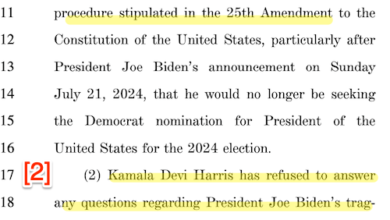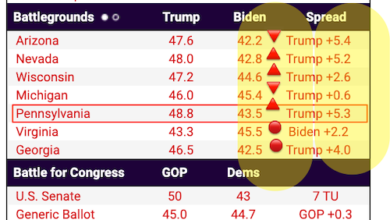Strategy to Kick Trump Off the Ballot Under the Fourteenth Amendment Already Causing Chaos (So In Re Griffin Was Correctly Decided)

By Lambert Strether of Corrente.
“I accept this arena as my friend. The conditions here are my conditions but Prosecution has defiled the sacred traditions of this place. Does the court give me leave to slay her outright?” –Frank Herbert, The Dosadi Experiment
As readers who have been following along at home know, there is a concerted, bipartisan effort to use Section Three of the Fourteenth Amendment (the “Disqualification Clause”) as a justification for removing Trump from state Presidential ballots on the grounds that he is an insurrectionist. This effort started in January 2021, immediately after Biden’s inaugural, but caught fire when two members of the Federalist Society, William Baude and Michael Stokes Paulsen, published “The Sweep and Force of Section Three” (“Sweep and Force”), which argued not only that Trump was an insurrectionist, hence disqualified, but that Section Three is “self-executing,” in that any official with responsibility for the ballot has the power to remove his name for that reason, no conviction in a court of law required. Shortly after “Sweep and Force”‘s publication, it was enthusiastically endorsed by legal luminaries like Larry Tribe and J. Michael Luttig, and its validity is now taken to be part of what passes for conventional wisdom these days, at least among non-Trump supporters, both conservative and liberal.
“Sweep and Force” originally urged that state election officials could disqualify Trump all by themselves, much as they already do for ballot eligibility requirements like age and residence. However, these officials have so far taken the view that disqualifying a candidate for being too young or not living in the district is one thing, easily, indeed mechanically, ascertained, while determining that a candidate is or is not an insurrectionist is quite another, and not so ascertainable. So they requested backup, which the NGOs now leading the Section Three efforts sought to provide. Jurisdiction shopping followed, and we now have two decisions disqualifying Trump under Section Three, the first from the Colorado Supreme Court, the second from the Maine Secretary of State, the Maine decision citing to Colorado. (Both decisions are stayed, awaiting a decision by the Supreme Court.)
In this post, I will argue that the Colorado and Maine decisions, taken together, show that “Sweep and Force”‘s notion that Section Three is self-executing is both wrong and a very bad idea. In other words, In Re Griffin (1869), in which Chief Justice Samuel Chase, shortly after the passage of the Fourteenth Amendment, took the view that Section Three is not self-executing, was correctly decided, and Baude, Paulsen, Tribe, Luttig, and the various journamalists hot-taking their opinions retail, who urge that it was incorrectly decided, are themselves wrong. First, I’ll present key features of the Colorado and Maine decisions. Then, I will look how “Sweep and Force” treats Griffin, contrasting Baude and Paulsen’s approach to what Justice Chase actually wrote. I’ll conclude with some brief comments about potential effects of “Sweep and Force”‘s daft ill-advised theory on “self-execution” on our Constitutional order.
Oh, the Frank Herbert epigraph. First, The Dosadi Experiment is terrific, even if Dune and its various canonical and non-canonical sequels have crowded it off the shelves. More importantly, the stakes in the Section Three mishegoss are, as in Herbert’s court arena, very, very high: For the nation, for our Constitution, for the parties, for the court system, for the reputations of the participants and, of course, for the outcome of election 2024. Now let’s look at the decisions.
Section Three Decisions in Colorado and Maine
I will look for two key features for both cases: The decider, and the burden of proof. The Colorado case (Anderson v. Griswold) was decided by the judicial branch. The burden of proof was “clear and convincing evidence.” From the decision:
The court issued its written final order on November 17, finding, by , that the events of January 6 constituted an insurrection and President Trump engaged in that insurrection.
Here is what “clear and convincing evidence” means:
“Clear and convincing evidence” is a medium level burden of proof which must be met for certain convictions/judgments. This standard is a more rigorous to meet than preponderance of the evidence standard, but less rigorous standard to meet than proving evidence beyond a reasonable doubt. The clear and convincing evidence standard is employed in both civil and criminal trials. According to the Supreme Court in Colorado v. New Mexico, 467 U.S. 310 (1984), “clear and convincing” means that the evidence is highly and substantially more likely to be true than untrue. In other words, the fact finder must be convinced that the contention is highly probable.”
The Federal statute against insurrection, 18 U.S. Code § 2383, is a criminal statute, hence “beyond a reasonable doubt” would apply (although the “clear and convincing” burden also applies in some criminal cases, the examples given don’t seem as weighty as insurrection).
Now let’s look at Maine. The Maine case (In re: Challenges of Kimberley Rosen, Thomas Saviello, and Ethan Strimling; Paul Gordon; and Mary Ann Royal to Primary Nomination Petition of Donald J. Trump, Republican Candidate for President of the United States) was decided in the executive branch, by the Secretary of State. From the decision:
Under Section 443 of Title 21-A, the Secretary of State is responsible for preparing ballots for a presidential primary election. The Secretary must “determine if a petition meets the requirements of,” as relevant here, Section 336 of Title 21-A, “subject to challenge and appeal under section 337.” 21-A M.R.S. § 443…. On Monday, December 11, 2023, I issued a Notice of Hearing to all parties, indicating that a consolidated hearing would be held at10:00 am on December 15, 2023, in Augusta. The Notice informed the parties that the hearing would be conducted in accordance with 21-A M.R.S. § 337 and the Maine Administrative Procedure Act (“APA”)…. Title 5, Section 9057 sets forth the governing standard for admissibility of evidence ni Section 337 proceedings. It is more permissive than the Maine Rules of Evidence, see 21-A M.R.S. §9057(1), and directs that “,” id. § 9057(2). I “may,” though by no means must, “exclude irrelevant or unduly repetitious evidence.” Id. This “,” State v. Renfro, 2017 ME 49, 1 10, 157 A.3d 775, affords me substantial latitude to decide what evidence to admit, though it generally favors admissibility.
This “relaxed” evidentiary standard is from administrative law, not civil or criminal law, so I’m not clear on how directly it relates to “clear and convincing,” but it’s clearly looser, and has an expansive notion of “the record,” including as it does “videos,” “staff reports,” “Tweets,” and “Multiple government reports,” many of which are not cited, even to Exhibits.
Now let’s turn to the legal doctrines that support — or do not support — the decisions in Maine and Colorado. The key cases, again, is In Re Griffin. If Griffin was correctly decided, then Section Three of the Fourteenth Amendment is not self-executing, and the efforts sparked by “Sweep and Force” fall to the ground. From Harvard-Professor-of-Constitutional-Law-But-Not-Larry-Tribe, Adrian Vermeule:
Chase held [in Griffin] that the disqualification embodied in Section 3 is not “self-executing,” legal parlance meaning that Congress must first implement the disqualification by appropriate legislation under Section 5 of the 14th Amendment. If Griffin’s Case is correct in this regard, then the case for disqualifying Trump immediately collapses, as no proceeding conducted under congressional legislation has found Trump to have participated in or aided “insurrrection.”
Hence the Maine and Colorado cases, and all similar, go away too (subject, of course, to whatever the Supreme Court does).
The Doctrine of In Re Griffin: “Convenience” or “Ascertainment”?
Cheekily, this is how Baude and Paulsen begin their discussion of Griffin in “Sweep and Force”:
A small problem with our view that Section Three is self-executing and immediately operative is that the Chief Justice of the United States said the opposite, almost immediately after the Fourteenth Amendment was adopted. This was the opinion in Griffin’s Case by Chief Justice Salmon P. Chase, sitting as Circuit Justice in 1869, in one of the first cases to interpret any part of the Amendment. In Griffin’s Case, Chief Justice Chase concluded that Section Three is inoperative unless and un- til Congress passes implementing legislation to carry it into effect. This precedent continues to cast a shadow over Section Three today.
First, to make what amounts to debater’s point — and here is where I loudly announce that IANAL (I Am Not A Lawyer), so real lawyers please correct — Griffin was “a case of first impression.” After all, it was “one of the first cases to interpret any part of the Amendment” (though Baude and Paulsen cite no others). From Cornell’s Legal Information Institute:
A case of first impression is a case that presents a legal issue that has never been decided by the governing jurisdiction. An example is the 1978 Supreme Court case Monell v. Department of Soc. Svcs. which decided whether local governments were considered “persons” under the Civil Rights Act of 1871.
A case of first impression lacks controlling precedent. In other words, a court deciding a case of first impression cannot rely on prior decisions nor is the court bound by stare decisis. To adopt the most persuasive rule of law, courts will look to various sources for guidance. These sources include:
- legislative history and intent,
- policy,
- custom, [and]
….
- the law in other jurisdictions.
One might imagine, therefore, that Baude and Paulsen, as card-carrying originalists, would give great weight to Chase’s opinion, given that it was rendered contemporaneously with the Fourteenth Amendment, and he, as Chief Justice, was surely well-equipped to understand its history and intent, policy goals, the customs of the time, and the law in any other relevant jurisdictions. But apparently not.
Here, however, is “Sweep and Force”‘s central objection to Griffin:
The core of Chase’s argument was that if Section Three were an immediately operative, self-executing constitutional rule of disqualification, it would have inconvenient consequences in the Reconstruction South. “In the examination of questions of this sort,” Chase wrote, “great attention is properly paid to the argument from inconvenience.” And here “the argument from inconveniences” was “great” in Chase’s estimation— it was “of no light weight.”
And:
To give Section Three immediate effect would thus upset the apple cart in a fairly major way. “No sentence, no judgment, no decree, no acknowledgement of a deed, no record of a deed, no sheriff’s or commissioner’s sale—in short no official act—is of the least validity.” Chase found this unthinkable: “It is impossible to measure the evils which such a construction would add to the calamities which have already fallen upon the people of these [Southern] states.”
But:
Chase’s construe-to-avoid-the-force-of-constitutional-language-whose-policy- consequences-you-dislike approach to constitutional interpretation is simply wrong. Judges do not get [sez who and when?] to rewrite constitutional provisions they find objectionable on policy grounds.
That’s what originalists think today. But isn’t that just a wee bit presentist? Are we really to believe that a Chief Justice of the United States is unable to correctly construct a canon of interpretation? After all, “[t]here is danger that, if the [legal scholars] do not temper [their] doctrinaire logic with a little practical wisdom, [they] will convert the constitutional Bill of Rights into a suicide pact” (Terminiello v. Chicago, 337 U.S. 1, 37, 69 S.Ct. 894, 93 L.Ed., adapted). Or if not suicide, severe and persistent disability. Then again, perhaps Baude and Paulsen don’t find suicide “objectionable”?
However, I think “Sweep and Force” has the “core” of Griffen wrong. That core is not “convenience,” but “ascertainment.” Quoting Baude and Paulsen quoting Chase:
Having flailed to avoid the natural [whatever that means] reading of Section Three, Chase finally offered his alternative, “reasonable construction”:
For in the very nature of things, , before any sentence of exclusion can be made to operate. To accomplish this and ensure effective results, proceedings, evidence, decisions, and enforcement of decisions, more or less formal, are indispensable; and these can only be provided by Congress. Now, the necessity of this is recognized by the amendment itself, in its fifth and final section, which declares that ‘congress shall have power to enforce, by appropriate legislation, the provision[s] of this article.’ [sic] … The fifth section qualifies the third to the same extent as it would if the whole amendment consisted of these two sections.
Now the logic-chopping and table-pounding really begins:
Section Five “qualifies” Section Three. Of course, this proves too much. . It would imply that Section One had no self-executing legal effect, which has never been the law.
I disagree; Baude and Paulsen aren’t doing a serious reading. In Chase’s phrase, “it must be ascertained what particular individuals are embraced by the definition,” we recognize what in the programming and math worlds is called a set membership function: “A function that specifies the degree to which a given input [say, Alexander Stephens] belongs to a set [say, insurrectionists].” That is, we need to determine the set of all insurrectionists; how do we “ascertain” that potential “inputs” to that set belong to it? That method of ascertainment is unknown, which is why “effective results, proceedings, evidence, decisions, and enforcement of decisions, more or less formal, are indispensable.” We do not need to do similar “ascertainment” for birthright citizenship, privileges or immunities, due process, and equal protection; all those are well understood, as the method to ascertain an insurrectionist was not (given that it had never been done before!). Chase conclude that these methods can “these can only be provided by Congress,” and here Baude and Paulsen disagree, arguing:
It also proves too little. It is true, perhaps, that carrying a legal prohibition into practical effect in actual situations frequently will involve, necessarily, actions by persons and institutions charged with applying that prohibition as law in the course of performing their assigned duties. But as noted above
If so, that makes Section Five (“congress shall have power to enforce”) a hood ornament; it could be deleted entirely without changing the sweep or force of Section Three. How on earth is that the “natural” reading of which, mere paragraphs above, Baude and Paulsen were so fond?
Conclusion
What Chase in Griffin sought to avoid, and Baude and Paulsen incited by “Sweep and Force” has now come to pass, driven by an unholy alliance of Federalist Society members and liberal Democrat NGOs MR SUBLIMINAL Does the court give me leave to slay them outright?[1]. We have “various” “State” “actors” “exercising their usual authority with respect to such matters” as both Colorado and Maine have disqualifed Trump from the ballot.
And what do we have? Two different (“various”) branches of government, judicial and executive, in two states using two completely different evidentiary standards. Add one or two more states, another branch, and a few more evidentiary standards, and you’ve got a combinatorial explosion of “usual authority”! And what is the average voter to think? That the only outcome that matters is kicking Trump off the ballot, so that Maine’s “relaxed” and Colorado’s “clear and convincing” both amount to due process? And while we’re talking about evidentiary standards, whatever happened to “beyond a reasonable doubt”? With the Justice Department and entire political class bellowing for Trump to be convicted, why on earth has Biden’s Justice Department never charged him under 18 U.S. Code § 2383 – Rebellion or insurrection? One might be forgiven for concluding that they never charged him because they couldn’t convict him. So, by definition, Maine and Colorado, in their decisions, are disqualifying Trump even though there’s “reasonable doubt” that he is an insurrectionist. What if their decisions are upheld, and those missing electoral votes decide the race? Is that the optimal strategy for reinforcing the voters’ confidence in the electoral system?
This is the Pandora’s box that “Sweep and Force” has gleefully opened. These already whacky results provide the clearest possible indication that Griffin was correctly decided, and that there should be national legislation to handle the ascertainment issues Chase described. Article II reads:
The executive Power shall be vested in a President of the United States of America.
Article II does not read:
The executive Power shall be vested in a President of the various state and federal actors, exercising their usual authority with respect to such matters.
Congressional legislation at the national level, at last implementing Article 5, is the only sensible solution (granted, providing the pleasant prospect of Democrats and Republicans defining, together, what insurrection is). Quoting Taibbi:
I’m no lawyer, but I doubt the 14th Amendment was designed to empower unelected state officials to unilaterally strike major party frontrunners from the presidential ballot. If it was, that’s a shock. I must have missed that in AP Insane Legal Loopholes class. Is there any way this ends well? It feels harder and harder to imagine.
(Taibbi is correct in that neither the Colorado Supreme Court nor the Maine Secretary of State are elected.) I guess it ends well if the Supreme Court makes it end well. Let me know how that works out!
NOTES
[1] Kidding!Source link




